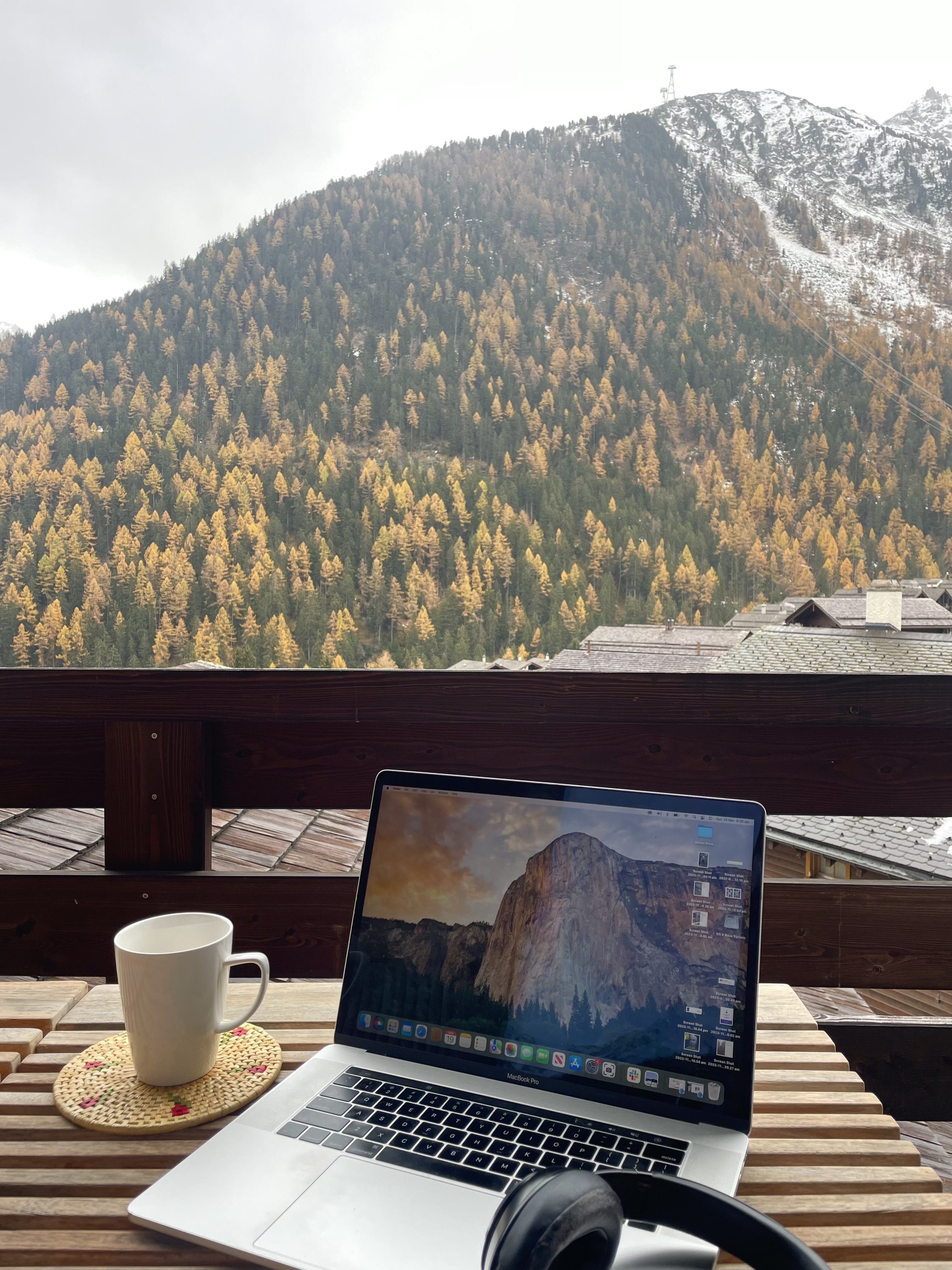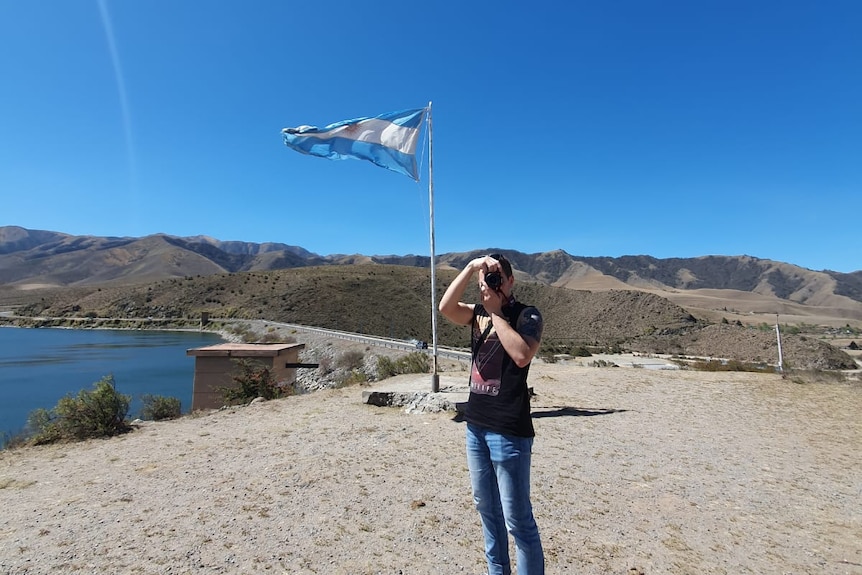These Australians work remotely while travelling overseas. But are they really living the dream?
6 min readOlivia Ashworth works 20 hours a week.
On the days she’s not working, she’s backpacking through Europe, exploring a new city every few days.
“Last week I was filming myself for my social media job in the middle of a park in Spain and this week I’m in a co-working chalet in Switzerland,” she tells the ABC.

The 23-year-old from Brisbane says following the traditional studying path was something she “never second-guessed”.
After high school, she jumped straight into studying a creative industries degree at university for three years, graduating at 20 and landing a job as a social media assistant for a creative agency.
Olivia was there for more than two years, working her way up to a senior position.
“I had been go, go, go, leaping from study to full-time work without a proper break,” she says.
“It was a matter of realising that life wouldn’t end if I took some time off. That I would be OK to take a break, and I deserved to.”

Already having a UK passport and “a decent amount of savings”, Olivia decided to take time off work and travel around Europe.
After four months, she decided to get back into the workforce.
“I wanted more of a routine and a little bit of income wouldn’t hurt,” she says.
But this time she was determined not to be locked down at the same office every day.
“That led me to my current position as a part-time social media content creator for a London-based social media agency.
“The company is quite small but there are employees all over the world. It allows me to work where and when I want.”
Olivia jumps between travelling around Europe on her own and with family and friends she has based in different cities.
Not all workers satisfied with WFH
The COVID-19 pandemic forced people all over the world to work from home.
But for some, home isn’t for them — they’d rather be working from white-sand beaches or tropical rainforests.
“Digital nomadism” is a lifestyle based around travelling and working remotely.
A key driver of the digital nomad trend is “the ability to maintain a career while ticking off other personal goals”, says Libby Sander, an assistant professor of organisational behaviour at Bond University.

“It offers the ability to travel and experience a different way of life,” Dr Sander tells the ABC.
“The war for talent is no longer just between companies. More than 40 nations or territories now offer ‘digital nomad’ visas to attract those able to be employed in one country while living, and spending their income, in another.”
More challenging, ‘no matter how idyllic your location’
But before you pack your bags, Dr Sander says you really need to consider whether being a digital nomad is right for you.
“Living a long way away from family and friends and support networks is likely to be more challenging, no matter how idyllic your location,” Dr Sander says.
“If you like structure and routine, the uncertainty and inevitable inconveniences that arise may mean it isn’t for you.”
Deciding on which country to work remotely in is also a challenge.
Australia is the 25th best country for remote work, according to the Global Remote Work Index (GRWI) compiled by cybersecurity company NordLayer.
Denmark took the number one spot, with The Netherlands second and Germany third.
The GRWI from 2023 revealed the best and worst countries to work remotely based on four criteria:
- 1.Cyber safety
- 2.Economic safety
- 3.Digital and physical infrastructure
- 4.Social safety

The NordLayer index says Demark is a “balance of modernity and social cohesion”, while the Netherlands is a “sterling blend of culture and connectivity”.
Germany meanwhile is “synonymous with economic vigour and technological knowledge” and Spain is seen as a “sun-kissed jewel in the remote work crown”.
“[Remote working’s] not just a trend — it is a fundamental shift in how we approach productivity and work-life balance,” says Donatas Tamelis, managing director at NordLayer.
“Embracing remote work empowers teams to harness their full potential, regardless of geographical boundaries.”
Remote work ‘pushes you in different ways’
No-one to go on coffee breaks with, no making small talk in the kitchen and no-one to steal your milk all come with the territory of remote work.
While Olivia gets to work in stunning locations with picturesque backdrops, she says there are disadvantages like losing the social aspects of work.
“It pushes you in different ways. I rely on myself for motivation,” she says.
Dr Sander echoes this.
She says some studies have shown remote workers can feel “socially and professionally isolated”.
Which is why she says having an employer that’s supportive of your move is important.
Experts also warn you should research any potential tax, visa and other laws of a country you’re planning to work from.
Olivia says finding good wi-fi is another big challenge.
“When you’re booking and moving places, you always have to consider what the conditions will be like if you have to have meetings, meet a deadline or sometimes in my case, film yourself in a quiet and well-lit environment,” Olivia says.

But Olivia says she enjoys having the flexibility to mould a job around her personal life.
“I think in this digital world, you really do have to be more flexible as a business. Not only to adapt to the changing world, but also the people and market,” she says.
“So many businesses are now offering remote work and trusting their employees to integrate work in their lives as they see fit.
“Your work should fit into your life, not the other way around.”
Despite all the benefits, Olivia says she can “definitely” see herself returning to Australia in the near future.
“It would be for the stability and a physical office where I can go in and see a whole team again,” she says.
‘Remote work is something I would do long-term’
Unlike Olivia, Thomas Scotson from Perth wants to work remotely for as long as he can.
The 24-year-old went from studying nursing at TAFE to teaching English in Madrid.
He moved there in 2022 after he discovered a well-known English teaching program in the city.

Thomas taught primary and high school students for seven months before he decided to travel.
He’s now ended up in Buenos Aires where he teaches English on a language platform called Preply.
Done completely online, Preply connects tutors to learners in more than 100 countries. The tutors set their own rates, but Preply takes a commission from each class.
“I make $500 a week on Preply,” Thomas says.
“In Latin America, this is absolutely a comfortable amount, especially in Argentina.
“If I were to live in northern or central Europe and still travel, it would be more of a struggle.
“It’s the same for Australia. I would still struggle there.”

Thomas says remote work is something he plans to do long-term.
“It saves you the hassle of several things, such as commuting for long distances.”
But as expected, Thomas has endured his own setbacks.
He says some professions of remote work “don’t offer the same level of stability as an office job” when it comes to hours and salary.
Thomas and Olivia also see eye-to-eye about what the most challenging aspect of remote work is.
“The hardest part is a lack of interaction with co-workers and the inability to create friendships with them.”
Loading…



